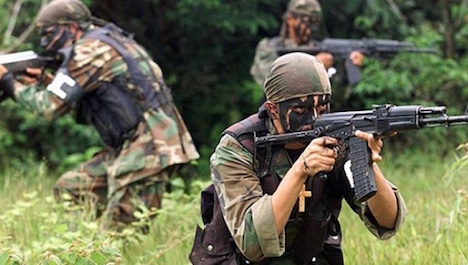The torture and murder of journalists, activists and the poor in Colombia, coupled with the near "extinction" of Indigenous groups, has made Colombia highly favorable to British interests.
The recent disappearance of two journalists from Colombia’s RCN network highlights not only the complexities of the country’s dire political situation, but the insularity of Euro-American thinking. The Associated Press reports the Colombian government’s speculation that the journalists were kidnapped by the government’s so-called “enemies,” the National Liberation Army or the Revolutionary Armed Forces of Colombia (FARC). The report does not mention the massive, persistent levels of violence against journalists by the government’s paramilitaries and associated gangs, which came to prominence after the former’s so-called demobilization. In its 2015/2016 world report, Amnesty International congratulates the FARC’s “unilateral ceasefire” but cautions that the rival paramilitary forces are given a free pass by domestic legislation which enables them to continue their decades-long repression of civilians, including “unlawful killings, torture, enforced disappearances, death threats, forced displacement and rape.” Many of the government’s victims are political opponents, socialists, union leaders, and students. In January, a British MP asked “what information” the British government “holds on how many cases of murder of (a) human rights defenders, (b) trades unionists and (c) political activists there have been in the last three years in Colombia for which someone has been brought to trial[?].” Minister of State, Hugo Swire, replied: “we do not compile statistics on these cases.” Self-imposed ignorance is a safe option for the British government, given that its material support for Colombia’s military (which in turn trains the paramilitaries) amounts to an abuse of human rights, under international law. The killing of Charlie Hebdo staff in Paris in January 2015, allegedly by al-Qaida operatives, provoked outrage in Europe, with the “I am Charlie” solidarity craze sweeping the continent. As media and activists pontificated about protecting free speech and human rights from Muslims in Europe, Colombians were still hurting from the murder of Luis Carlos Cervantes Solano, director Morena FM radio. Major outlets like the BBC didn’t even report on his murder, let alone were there “I am Luis Carlos” demonstrations. Solano “was gunned down in the street in Taraza, a town in the northern department of Antioquia” a few months before the Hebdo shootings after uncovering alleged links between drugs, gangs, and the local mayor. A few months after Solano’s murder and under the pretext of counter-narcotics operations, Britain’s Minister of State for the Armed Forces, Mark Francois, said: “The Ministry of Defence has an ongoing programme of military support to Colombia … however we do not release any detailed information.” As with the Swire quote above, the British government likes to play it safe about revealing the extent of its involvement in human rights abuses. One month before Solano’s murder, Lord Alton indicated to Parliament where Britain’s military assistance really goes: “guerrillas and successor groups to paramilitaries have continued to be involved in significant acts of violence. Human rights defenders, trade unionists, journalists, indigenous and Afro-Colombian leaders and IDP [internally displaced persons] leaders regularly face death threats, intimidation and other abuses.” Alton went on to say that “the displacements have frequently come about as a direct consequence of corporate investment, when land is wanted for agriculture, oil exploration or coal mining. According to the Colombian constitutional court, 34 groups of indigenous peoples are currently at risk of extinction.” The torture, disappearance and murder of journalists, activists and the poor in Colombia, coupled with the near “extinction” of Indigenous groups, has made Colombia “the best business environment amongst the main economies of Latin America,” said the British Foreign and Commonwealth Office in 2010, adding: “We do remain open for business.” A later report boasted of Colombia’s “sustained record of sound economic policies … [and] strong economic fundamentals.” Lord Alton concluded that “the U.K. has created in [its new] trade treaty something that will benefit British businesses but harm exploited and vulnerable people.” Alton was referring to the Bilateral Agreement for the Promotion and Protection of Investments between the United Kingdom and Colombia. Numerous human rights groups and NGOs have cautioned that the treaty will reverse the land reforms fought for by FARC and other groups. Luckily for British businesses, the paramilitaries and their gangs, as well as private security contractors (or mercenaries) hired by the likes of BP oil and AngloGold Ashanti are still active. Solicitors, Leigh Day & Co., write that since the late-1980s small-scale farmers have faced “devastating environmental damage” as a result of the OCENSA oil pipeline “led by BP Exploration (Colombia) (BPXC), a then wholly owned subsidiary of BP plc.” The firm concludes that “alleged impacts include extensive and continued soil erosion, destruction of small streams, poor water quality, the creation of large marshy areas and poor soil quality,” which literally risk farmers’ survival. Small steps toward peace have been taken in the last ten years, with violence appearing to decrease, US military aid to Colombia declining slightly, the fragile truce with FARC agreed to, and the bringing to international attention by brave activists the dire threats they face. Groups like Justice for Colombia and the Colombia Solidarity Campaign have been working hard domestically. In Europe, we can help Colombians by finding the small courage to speak out against the military-corporate networks which bear a directly responsibility for mayhem and misery. T.J. Coles is director of the Plymouth Institute for Peace Research and the author of Britain’s Secret Wars (Clairview Books, 2016). Source URL |
